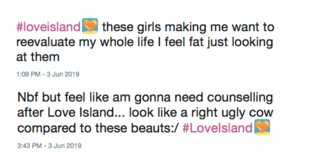Relationships
Plastic Perfection: Wanting the "Love Island" Body
"Love Island" is back. What does it teach us about our bodies?
Posted June 19, 2019
Last year’s Love Island captured the nation. It was one of the most watched TV programs with 3.6 million turning in to watch last year’s final. 2019’s show is gearing up to do the same, and maybe even bigger than in 2018. Love Island returns to our screens this week. Without exception, each of the confirmed contestants and actual contestants fits the dominant global beauty ideal: They are all thin (with curves), firm, smooth and young.
The message of Love Island is that in our culture bodies matter—and only if you have a perfect body can you succeed, can you be loved, can you be good enough. Love Island bangs home the message that to succeed in whatever you do, you must also succeed in beauty. Being better is about having a better body and this is something we can and should achieve, or at least be working towards. Love Island promotes beautiful, ideal, even perfect bodies. These bodies have had ‘work done’—surgery—and been ‘worked on’—constant diet and exercise. Amy has already said her boob job, at age 21, was paid for by her grandparents. These are extremely modified bodies. They have been sliced, implanted, pumped and plucked. They send the message that you too should have work done if you want to make the grade.
One of last year's contestants—Megan Barton-Hanson—caused a media and social media storm. She had her first surgery—to pin back her ears—at 14 years old and spent £25,000 on subsequent surgeries. Her transformation is dramatic—and a quick Google shows you numerous before and after shots—with shock, delight, amazement, and envy among the many emotions that accompany the commentary. But, whether approving or disapproving, a common focus is on Megan's transformation. That she looks like a different person.
The message Love Island gives is that if you too want to be loved, want to be beautiful, you too must work on your body. If only you ate right, exercised right, got the right surgeon and had the right procedures, you too could make the grade. The shadow side of this is that if you don't, if you 'let yourself go,' you should feel bad, you should be ashamed. In our visual and virtual culture body shame is not minor — it really is a shame on the self.
Love Island's creative director, Richard Cowles, denies this is what Love Island is doing:
"We're not saying that everyone that's in there is how you're supposed to look. We're saying here's a group of people that we want to watch for eight weeks, and we want to watch them fall in love."
Really? Come on. If this were true would so many of us hate our bodies in response? 2018's show made us feel bad about our bodies:
Feeling like a 'proper whale', 'insecure', 'fat', 'ugly' with 'no self-esteem', are snapshots of the social media comments that capture the feelings of failure, shame, and dissatisfaction.
We are only in the first week and already we are feeling bad about our bodies and fat shaming:

While we have always had beauty ideals we have never been able to body-modify so extensively. To change our body shape and body parts so we literally look like a different person. Already we are wanting to change our bodies in response to the beauties of Love Island and in some cases we already have! One Love Island hopeful, Emily Dorrell, reportedly spent £15k on surgery in an attempt to get onto the show. Beauty has never mattered so much, and feelings of shame and disgust have not run so deep. Love Island's popularity or infamy, tells us something we need to take note of. It is not enough just to dismiss this.
We live in a world where beauty success has become success and to fail at beauty is to be a failure. We can tell our daughters that it's what's on the inside that counts, but they know this isn't true. We need a better response than this, one which recognizes just how powerful the beauty ideal is and how much pressure this puts on very many of us.
If our bodies are ourselves, shaming bodies is shaming people. We should call out body shaming, we should work collectively to reduce the pressures to be perfect. We have to recognize how damaging body image anxiety and body image shame is. That's why we are encouraging people to share their experiences and join our #everydaylookism campaign.


